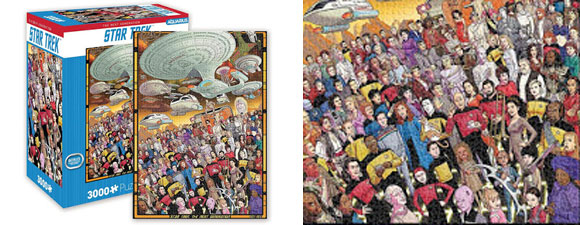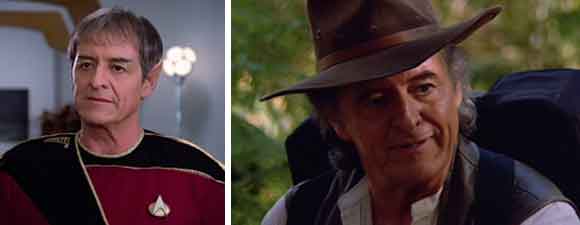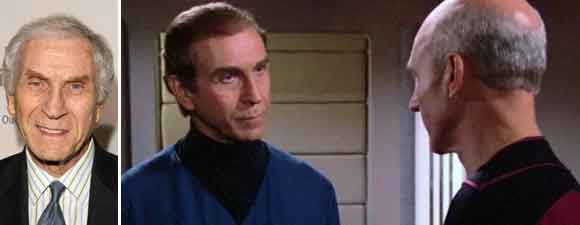Retro Review: Parallels
7 min readWhen Worf finds reality shifting around him while no one else seems aware of the change, he concludes that he is moving from universe to universe.
Plot Summary: Though happy to have won a bat’leth tournament, Worf is dreading the surprise birthday party he knows Riker has planned for him, but he soon has bigger problems: Picard appears at the party after Worf was told that he could not attend, and the cake changes from chocolate to vanilla. Later, while helping Data and LaForge determine whether a Cardassian ship has tampered with the telescopic Argus Array, Worf feels dizzy and the room seems to change. Crusher tells him that this is probably a result of the concussion that made him lose the bat’leth tournament. When Worf returns to his quarters, he finds that his large trophy has transformed into a small prize for ninth place. On the bridge, Picard begins a conversation with a Cardassian captain; Worf warns that his ship appears to be the one that attacked the Argus Array, but Picard has no idea what Worf is talking about. When Worf tells Troi of his disorientation, he finds that the painting Data gave him for his birthday has changed. Suddenly he finds himself on a bridge with a new set of defensive controls, with the ship at Red Alert and Picard ordering him to raise shields. Worf cannot find the proper settings, and while Riker takes over the panel, the Cardassians destroy the Argus Array. Picard has no recollection of Worf’s previous memory problems and relieves him of duty. When Worf returns to his quarters, Troi tries to comfort him and is shocked when Worf fails to remember that he is married to her. Data makes the observation that LaForge was present in each instance in which Worf describes dizziness and disorientation. They try to talk to LaForge in sickbay, but he has died of wounds suffered in the Cardassian attack. Data and Crusher test LaForge’s VISOR to see whether that might be affecting Worf, but as soon as they activate it, Worf becomes dizzy again and finds himself wearing the first officer’s uniform on a militarized Enterprise. Data tells Worf that his body is in quantum flux at the molecular level, which the pair report to Captain Riker, who tells Worf he was promoted after Picard was killed by the Borg. Riker also claims that Worf never took a shuttlecraft to the bat’leth tournament, but Lieutenant Wesley Crusher finds a fissure in the space-time continuum with a Starfleet shuttlecraft’s ion trail leading from it. When the crew scans the fissure, a Bajoran ship attacks, destabilizing the singularity, and hundreds of other Enterprises begin to pop into existence. Guessing that Worf must be returned to the universe that matches his quantum signature, Data scans for an Enterprise with the same signature and sends Worf back in his shuttle, though not before a grief-stricken Riker from a universe dominated by the Borg tries to destroy it. The fissure seals when Worf returns to his own universe and Worf relieves his homecoming, only this time, instead of a surprise party, he has a private dinner with Troi.
Analysis: Most fans I know either love or hate “Parallels,” and it has little to do with the science fiction gimmick, which is one of writer Brannon Braga’s favorites – he plays with a similar idea on his later series FlashForward, where future realities shift depending on choices made by characters in the past. “Parallels” is the foundation of the Worf/Troi romance, which proved so unpopular overall that Worf ended up marrying Jadzia Dax while Troi wound up with Will Riker. Looking back, it’s easier to see the relationship between Worf and Troi as a tolerable temporary development while the two of them came to terms with what they really wanted – in Deanna’s case, to reunite with her first love, and in Worf’s case, to find a woman with an innate understanding of what it means to be a Klingon man. But the Worf/Troi love affair never bothered me; if anything, all the things that make it unlikely and tentative also make it realistic and sweet. I know that’s not very sexy, and maybe it doesn’t allow for good television, but to me it’s the most mature, believable pairing in the Star Trek universe until Michael Piller finally gets Riker/Troi right in Insurrection. If there are characterization flaws in “Parallels,” for me they’re not with Worf or Troi, but with the crazy Riker who’d rather kill Worf and blow up the universe than go home and face the Borg. It’s not any Riker I have reason believe in, and worse, it’s played for laughs with a hugely hairy Riker at a moment when we could have seen a truly chilling glimpse of a future that might have been.
Bottle shows like “Parallels” – which take place entirely on standing sets, usually familiar rooms on the Enterprise – are generally produced to save money, so it’s a tribute to how well The Next Generation is written that they’re often among the show’s best. This one could easily suffer from redundancy, not only because similar things keep happening to Worf over and over, but because the scenario has elements in common with another Braga episode, “Cause and Effect” (the one where the Enterprise keeps blowing up) and with the superb “Yesterday’s Enterprise” (the one where Tasha Yar is alive and reality has shifted for everyone but Guinan). Excellent directing and one of Michael Dorn’s best performances keep “Parallels” from ever becoming boring, and subtle changes in the ship keep the episode visually dynamic; it’s as jarring for viewers when the tactical console changes as it is to Worf. Plus Wesley’s reappearance comes out of nowhere; I know he isn’t always popular with viewers, but his character is used to nice effect here. But the smartest shock is the revelation that Picard was lost to the Borg and Riker is captain of the Enterprise, something Data doesn’t make a big deal mentioning because to him it’s old news. Riker implies that Picard is dead, but I can’t help thinking about the worse alternative: that Locutus of Borg is alive and well and preparing to destroy Earth. Something personally horrific must have happened to the insane Riker of the universe where the Borg are winning – he must have a terrible reason to be so quick to try to murder a friend and Starfleet officer.
Worf is the perfect character to put in a scenario where reality keeps changing because he isn’t given to fretting in private or being afraid that he might be losing his mind – everything he does is proactive, and since it seems natural by now for a Klingon to consult a counselor when he’s having a hard time, it doesn’t seem implausible that he might have fallen in love with a Betazoid, particularly one whom he considers a worthy parent for his son. It’s too bad that Alexander doesn’t make a token appearance early on, because I think that would have provided more impact later when the Troi who is Worf’s wife tells Worf that Alexander never existed in her universe. Maybe Worf would feel more free to date if he had never experienced the pain of losing K’ehleyr, but the universes in which he is married to Troi are apparently even more violent, with the Borg stronger and the Bajorans lashing out at a Federation that didn’t help them overthrow the Cardassians. Considering that common affection for Alexander is one of the things that brought Troi and Worf together – it’s a big factor in “A Fistful of Datas,” when the three are trapped on the holodeck together, and “Ethics,” when Troi tries to help Alexander cope with Worf’s wish to commit suicide after an accident – I’d like more background on how Troi and Worf fell in love in a universe where Alexander never existed.
Yet even though I’ve always loved Riker/Troi as a couple and I’m delighted they found their way back to each other in the end, I really appreciate that there is no universe in which Riker and Worf are rivals, or even less than good friends. Worf cites a need to act with honor when he asks for Riker’s permission to court Troi, but I can’t help thinking that he’s more concerned about Riker’s feelings than Klingon courtship tradition, which has always seemed to be more about competition and throwing furniture than honorable behavior. Worf may be the lover of Riker’s Imzadi, yet Riker picks Worf to be his first officer over the perhaps more logical choice of Data. Troi may know Worf better than Riker does – she’s smart enough to talk the latter out of throwing the former a surprise party in at least one universe – but Riker’s miscalculations are born of affection, trying to make Worf have a little fun while Worf is wearing his sternest “I am not a Merry Man” face. It’s the antidote to Kirk and Spock fighting over T’Pring or Odo trashing his quarters because Kira is sleeping with Shakaar, with maturity and humor and a real commitment to putting the best interests of another person first – which is what real love is supposed to entail. A few episodes down the road, “Eye of the Beholder” has already started to unravel the Worf/Troi dynamic, so “Parallels” is really its warmest moment. No matter how happy anyone might be with his or her life, there are always moments of mentally playing out might-have-beens, so it’s fun to see Worf live some of his and discover that he’s more flexible than he might have imagined. All the sci-fi universe-jumping is just allegory.






